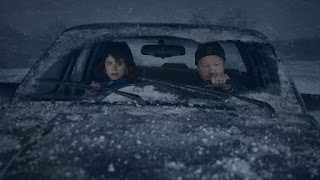I'm Thinking of Ending Things
The Netflix Original movie I’m Thinking of Ending Things is a movie perfect for streaming. It’s intimate, character-driven, and begging to be experienced more than once.
The movie centers on two characters – Lucy (Jessie Buckley) and Jake (Jesse Plemons) – and the chemistry (or un-chemistry) between them is mesmerizing. The movie follows a few hours of their lives together on a road trip date to meet his parents on their family farm. Every awkward moment between Lucy and Jake is a first blind date moment stretched to eternity. They met during an uncomfortable social moment in a restaurant – it seems (it’s one of their meet-less-than-cute stories) – and they’re bound together by her inability at that time and ever since to say “no.” In the first words we hear, she’s rehearsing break-up words in her head. Will she ever be able to verbalize them to him? He later reacts as if he can hear her interior words. Is he telepathic? (There’s a whole different reason for it in the source novel, but I won’t go there.)
She needs to progress from “I’m thinking of ending things” to “I’m speaking of ending things.” She’s too prone to taking the easy, confrontation-free approach and goes along with things. Lucy’s stuck at a crossroads with two possible avenues (about the only reference the movie doesn’t make is to the Scarecrow and Dorothy in The Wizard of Oz): break out of this relationship, turning Jake into a minor blip in the timeline of her life or never saying the words “I’m ending things” and spend the rest of her life with him. The movie is her experiencing the totality of the latter possibility all in one night. At one point during the drive to the farm, she likens time to being something, not that we pass through, but that passes by us like wind reducing our body temperature until we… end. The film holds her thought as it progresses deeper into a cold, snowy, and windy night.
The visit to the farm is the movie’s most unusual sequence. His parents – Toni Collette and David Thewlis in fine form – are strange, to say the least, but Lucy goes along with them, accepts them, and compliments them as if taking the path of least resistance through the evening. What’s most odd about the visit is his parents have no fixed age. From moment to moment, they change from middle-aged to young and vivacious to either Alzheimer’s inflicted (depicted by having handwritten labels posted all about the house identifying objects and rooms) or on a death bed. It’s a vivid illustration of the idea time is a construct, flowing and fluctuating around us as we stand still rather than us flowing through it.
The movie is more ambitious than being ruminations on assertiveness and being brushed by the winds of time. It also relates their situation to various forms of art: including painting, poetry, and cinema. She’s a painter, but are her paintings her own or artifacts out of art history? She recites a poem and he says, “It’s as if it was written about us.” And their relationship is compared to movie history – both made up and actual. Their first meeting in a restaurant is presented to us as if part of a hypothetical movie “Directed by Robert Zemeckis.” Their relationship is compared to Mabel and Nick Longhetti played by Gena Rowlands and Peter Falk in the John Cassavetes movie A Woman Under the Influence. Lucy adopts Rowlands’ odd facial and verbal ticks as she quotes from Pauline Kael’s infamous takedown of the classic movie. (Kael isn’t credited. Lucy recites the words as if they are her own impromptu analysis. I knew the words because Kael’s voice is distinctive and a copy of Kael’s review anthology For Keeps is shown on Jake’s childhood bookshelves. Oddly, her A Woman Under the Influence review isn’t included in that 1000 plus page tome. The first thing I did after watching the movie was pull my copy off the shelf and check.)
It’s fun stuff – if one is familiar with the Cassavetes movie and/or Kael’s writings – but one must work hard to piece together why these scenes are in the movie and how they relate to her inability to say the words “I want to end things.” These references – also including several nods to the musical Oklahoma – felt scattershot. The movie also has an ending (which continues beneath the end credits, don’t wander away) that takes open-endedness to a new high. As we ponder what has happened and add up the clues and a warning from a girl who makes Lucy and Jake ice cream, we’re left with an unusual – for some uncomfortable – latitude for interpretation. Is this a successful way of ending things? Opinions will vary.
I dug it.




Comments
Post a Comment
Comments are encouraged!